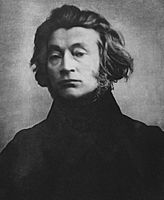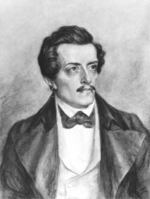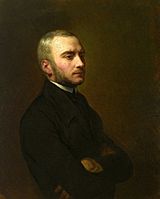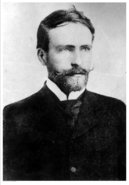Three Bards facts for kids
The Three Bards (Polish: trzej wieszcze) are famous national poets from a time in Polish history called Romanticism. This name is almost always used for three specific poets: Adam Mickiewicz (1798–1855), Juliusz Słowacki (1809–1849), and Zygmunt Krasiński (1812–1859). Of these three, Mickiewicz is seen as the most important, and Krasiński the least.
People believed the Three Bards not only shared the feelings of the Polish nation but could also see its future. They lived and worked outside of Poland because the country had been divided up by other empires. This meant Poland was no longer an independent state. Their sad poems and plays were written after the 1830 Uprising against Russian rule. Their works often focused on Poland's fight for freedom from these foreign empires.
The idea of the "Three Bards" became popular in the late 1800s. It is still important for people who study Polish literature today. However, some people think this idea is old-fashioned. As Krasiński's fame lessened, some suggested replacing him with Cyprian Norwid. Others thought Norwid or Stanisław Wyspiański should be added as a fourth bard.
What Does "Bard" Mean?
The Polish word "wieszcz" means a "poet-prophet" or a "fortune-teller". This term is often translated into English as "bard." A bard is a poet, especially one who is very important to their country. This idea comes from the old Latin term poeta vates, which means "poet-prophet." It describes a poet who was believed to have a special gift from the gods to see the future.
The term "Three Bards" (Polish: trzej wieszcze) is almost always used for Adam Mickiewicz, Juliusz Słowacki, and Zygmunt Krasiński. They are the most famous Romantic poets of Poland. Mickiewicz is thought to be the most influential of the three, while Krasiński is considered the least.
People have different ways of describing the trio. Mickiewicz, who was great at writing long stories in verse (epic poetry) and emotional poems (lyric poetry), is called the poet of the present. Krasiński, who was seen as a prophet, is called the poet who foretells the future. Słowacki, a dramatist (playwright), is seen as someone who praised the past. Another way to look at them is that Mickiewicz was the "positive voice of history." Słowacki was "the voice of the 'dark' side of Poland's fate." Krasiński was "the voice of Polish Catholicism."
History of the Bards
The word wieszcz came to Poland around the 1500s. At first, it was used for poets in general, even famous foreign ones like Homer. It was also used for Polish poets like Jan Kochanowski. But when Romanticism became popular in the 1800s, the term was mostly used for Mickiewicz, Słowacki, and Krasiński. Mickiewicz himself used the term for himself in 1842.
Even though these three poets didn't form a specific group, they became known as spiritual leaders for a nation that had lost its freedom. Poland stopped being an independent country in 1795 after it was divided up. It didn't become fully independent again until 1918. The Bards often used folklore in their work. This linked the word wieszcz to wise folk figures, like the legendary Wernyhora.
The idea that Mickiewicz, Słowacki, and Krasiński were the three most important poets in Polish history began around the 1860s. This view became very popular among Poles living outside their country. It was also taught in Polish textbooks for many years. This helped create a list of important Polish literary works that students would study.
This idea has lasted, even though some scholars have criticized it. They sometimes said it was old-fashioned or not quite right. There have also been discussions about whether Krasiński truly deserves to be one of the trio. Some wondered if other poets should be added. However, a literary historian named Kazimierz Wyka said that since the mid-1900s, the trio of Bards – Mickiewicz, Słowacki, Krasiński – has been seen as a classic and unchanging part of history, despite any arguments.
The Fourth Bard
In the early 1900s, people rediscovered the writings of Cyprian Kamil Norwid (1821–1883). This led some to call him a "fourth bard." Others counted him among the "four greatest poets of Poland." Unlike the Three Bards, Norwid's works were not popular when he was alive. They also weren't popular for many years after his death. Because of this, his work "remained isolated and unnoticed." It was "overshadowed by the three earlier literary 'giants'" (Mickiewicz, Słowacki, and Krasiński). These three were already famous both in exile and in Poland. So, Norwid did not influence his time as much as the Three Bards did.
However, some literary critics have doubted the value of Krasiński's work. They have even suggested that Norwid should be considered a third bard instead of a fourth.
Other critics have suggested Stanisław Wyspiański (1869–1907) as a fourth bard. His 1901 play The Wedding is considered a very important Polish drama. Some say this play alone earned him the title of fourth bard.
See also
- National poets
- Polish Messianism
- Romanticism in Poland





